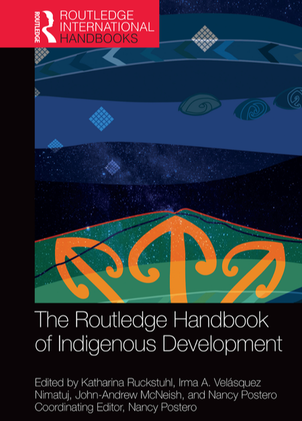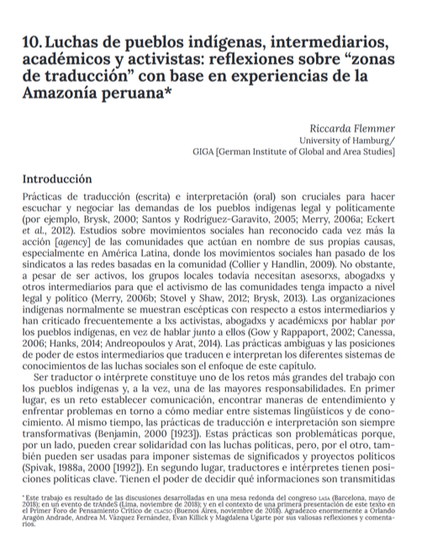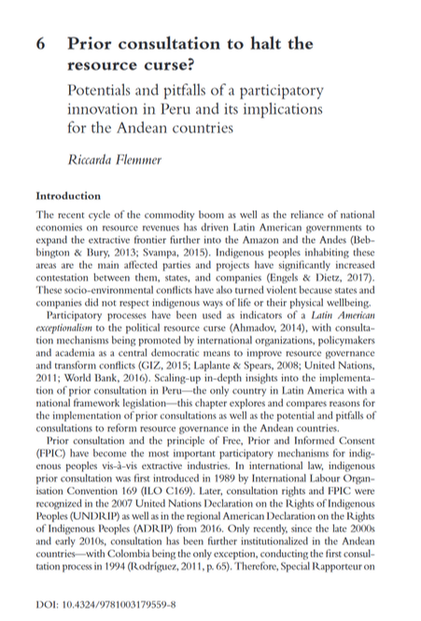The Implementation Paradox. Ambiguities of Prior Consultation and Free, Prior and Informed Consent (FPIC) for Indigenous Peoples' Agency in Resource Extraction in Latin America (2023)
|
Abstract
Across the world, Indigenous peoples contend with national development models dependent on the extraction of natural resources. One of the bloodiest conflicts over resource extraction in Indigenous territories took place in Peru in 2009. This chapter argues that the ‘implementation paradox’ of prior consultation and Free, Prior and Informed Consent (FPIC) can best be understood by focusing on Indigenous peoples’ agency and studying political struggles over the contested normative meaning of Indigenous international rights. It highlights Indigenous peoples’ contestation to prior consultation and FPIC, bringing together contestation literature from critical International Relations with insights from anthropology, political ecology, and decolonial studies on law. The chapter begins with a brief conceptual overview of prior consultation and FPIC as international norms, highlighting that their interpretations are deeply entangled and highly ambiguous. |
Flemmer, Riccarda (2023): ‘The Implementation Paradox. Ambiguities of Prior Consultation and Free, Prior and Informed Consent (FPIC) for Indigenous Peoples’ Agency in Resource Extraction in Latin America.’ In The Routledge Handbook of Indigenous Development, herausgegeben von Nancy Postero and John-Andrew McNeish. London: Routledge, 181-189. (Online first)
Luchas de pueblos indígenas, académicos y las "políticas de la traducción" (2022)
|
Abstract
¿Todas las intervenciones jurídicas en favor de lxs oprimidxs son iguales? ¿Todxs lxs abogadxs, antropólogxs, sociólogxs y otrxs que colaboramos con luchas sociales en los diversos campos jurídicos lo hacemos de la misma manera y con las mismas convicciones? Estas interrogantes motivaron la elaboración de la presente obra, que representa un primer, pero fundamental paso, para la construcción de un nuevo proyecto de práctica y comprensión del derecho en los campos jurídicos de América Latina, al que hemos denominado Nuevos Estudios Militantes del Derecho. A partir de las reflexiones de abogadxs, antropólogxs y sociólogxs de México, Brasil, Bolivia, Colombia, Argentina, Estados Unidos y Alemania, respecto de su propio actuar como académicxs comprometidxs con luchas sociales llevadas desde distintos campos jurídicos, o respecto de cómo otros actores desarrollan su praxis, todo esto se retoma en el presente estudio. |
Flemmer, Riccarda (2022): ‘Luchas de pueblos indígenas, académicos y las “políticas de la traducción”.’ In Otro Derecho es Posible: Diálogo de Saberes y Nuevos Estudios Militantes del Derecho en América Latina, edited by Orlando Aragón Andrade und Erika Bárcena Arévalo. Universidad Nacional Autónoma de México: Morelia, 221–235. (Open Access)
|
"Prior Consultation to Halt the Respurce Curse? Potentials and Pitfalls of Participatory Innovation in Peru and Its Implications for the Andean Countries" (2022)
|
Abstract
Prior consultation obliges governments to consult indigenous peoples about administrative or legal measures that might affect them—including resource extraction projects—and has been a central institutional innovation during the recent resource boom and post-boom. Legally, the right to prior consultation was first adopted in 1989 by ILO Convention 169. Since then, several Andean countries have implemented consultations, with Peru’s national framework law (2011) being a legal forerunner. Indigenous organizations played a crucial role in pushing for consultation rights. However, more recently, they have turned away from pursuing state-led consultations, while governments and companies changed their initial opposition to approval. This chapter takes a closer look at this reversal and argues that the recent opposition of indigenous peoples to state consultations does not signify a withdrawal from initial demands but rather exposes a widespread disappointment with the implementation processes so far. This insight is presented as a striking parallel between the Andean countries. The chapter shows that the formal institutionalization of prior consultation is not per se a guarantee for indigenous peoples’ rights; instead, its effects are ambiguous. Paradoxically, the informal politics of extractive industries enables communities to be more successful in vetoing extractive endeavors if they refuse consultation rights. Using an analytical lens that combines international relations research on norms with postcolonial approaches, the chapter explores prior consultation in the resource governance of the Andean countries by drawing on first-hand material from an in-depth study about prior consultation in Peru (2012–2018) and an extensive review of secondary literature. |
Flemmer, Riccarda (2022): "Prior Consultation to Halt the Resource Curse? Potentials and Pitfalls of a Participatory Innovation in Peru and Its Implications for the Andean Countries." In Andean States and the Resource Curse: Institutional Change in Extractive Economies, published by Gerardo Damonte and Bettina Schorr. London: Routledge, 104–21. (Open Access)
|
More Book chapters
- Flemmer, Riccarda (2019): ‘Prior Consultation as a Door Opener: Frontier Negotiations, Grassroots Contestation, and New Intercultural Politics in Peru.’ In The Prior Consultation of Indigenous Peoples in Latin America: Inside the Implementation Gap, edited by Claire Wright and Alexandra Tomaselli, Routledge Studies in Development and Society. London: Routledge, 106–118. (Link)
- Schilling-Vacaflor, Almut; Flemmer, Riccarda (2013): ‘Why is Prior Consultation Not Yet an Effective Tool for Conflict Resolution? The Case of Peru’, GIGA Working Paper No 220, April 2013, Hamburg. (Open Access)
- Flemmer, Riccarda (2012) ‘Die Consulta Previa in Peru. Zur umkämpften Implementierung des Konsultationsrechts unter Alan García (2006–2011)’, Selected Student Paper 37, Aachen: Institut für Politische Wissenschaft der RWTH Aachen, awarded with the Springorum-Denkmünze 2013. (Open Access)


